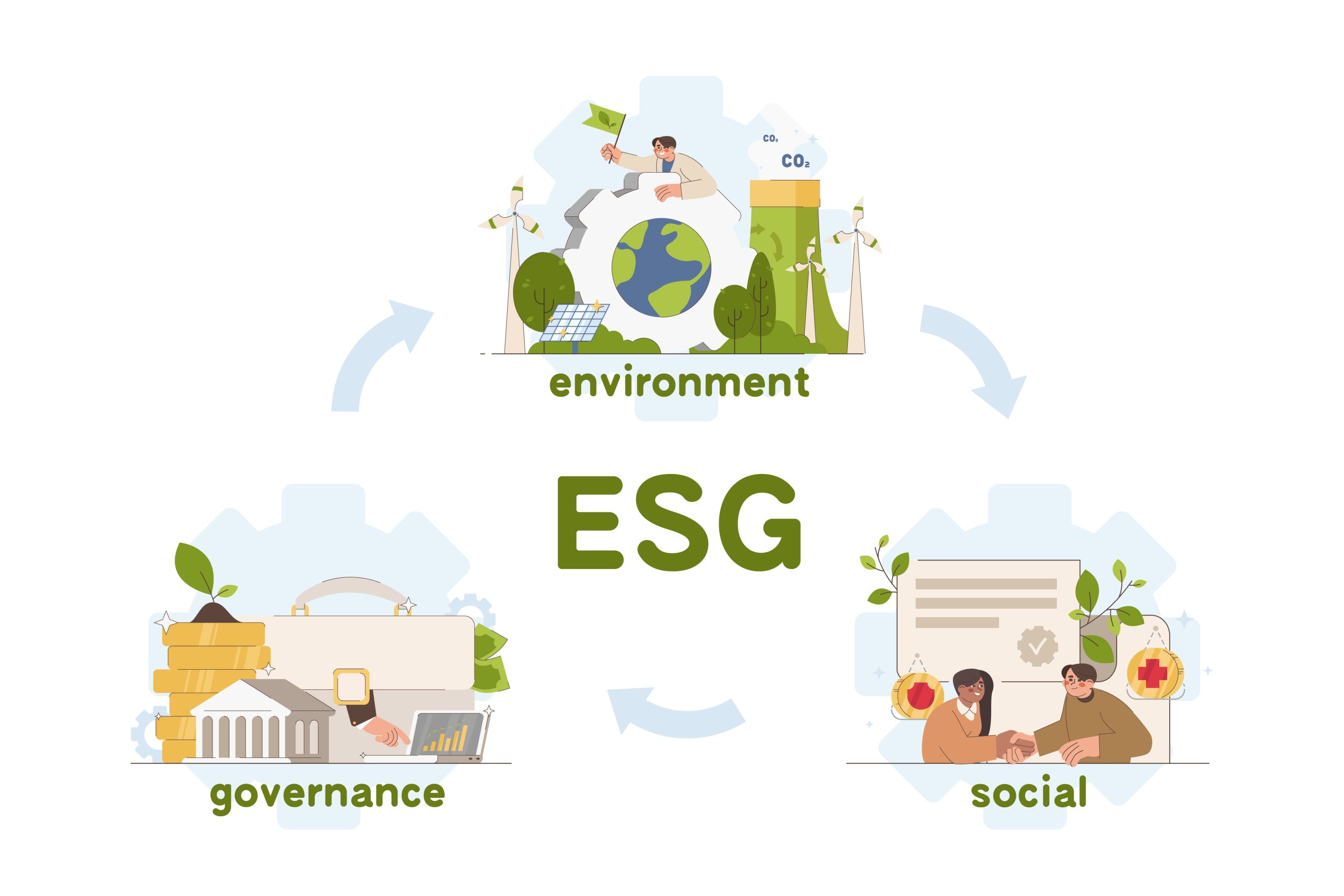ESG in Business: Concepts, Benefits, and Effective Implementation in Vietnam
In the context of globalization and increasingly evident climate change, ESG in business has become a crucial criterion that helps organizations develop sustainably, attract investors, and build a responsible brand image. In Vietnam, this concept is still relatively new but is increasingly gaining attention from businesses aiming for long-term growth.
So, what is ESG? Why is ESG important in business development strategies? And how can ESG be effectively implemented in Vietnam? Let’s explore in detail below with IBS.
What is ESG in business?
ESG stands for Environmental, Social, and Governance. These are the three fundamental pillars to evaluate a company’s sustainable development level and social responsibility.
- Environmental: Evaluates the company’s impact on the environment such as emissions, energy use, waste management, natural resources…
- Social: Considers social responsibilities like employee rights, gender equality, community contributions, workplace safety…
- Governance: Refers to management practices, transparency, governance structure, anti-corruption, shareholder rights protection, etc.

ESG in business means integrating these three elements into the entire operation, decision-making, and development strategy of the organization. Instead of focusing only on short-term profit, ESG aims for sustainable, responsible, and transparent growth to increase long-term value for both the business and the community.
Why is ESG in business increasingly important?

Benefits of ESG in business
Applying ESG not only helps organizations meet international standards but also delivers clear practical values in both short and long terms. The following are key benefits that strengthen business internal capacity and promote sustainable development:
Enhancing investment efficiency and capital access
Increasingly, global investment funds prioritize companies with sustainable development strategies. In 2023, ESG investment funds managed assets worth over $35 trillion USD — accounting for 36% of global total invested assets.
Thus, ESG improves credibility with financial institutions, enhances access to green capital sources, and boosts portfolio performance. BlackRock reports that stocks of ESG-certified companies increased by an average of 5-10% over 3 years. Morningstar shows nearly 60% of ESG funds outperformed traditional funds over the past decade.
More comprehensive and effective risk management
One of the most important roles of ESG is early prevention and control of risks. According to MSCI data, companies focusing on ESG tend to face fewer legal risks, environmental crises, and media scandals — reducing losses by up to 20% during crises.
With increasing climate change and social pressures, ESG acts as a “governance shield” helping businesses maintain stability and market reputation.
Optimizing operating costs and resource use
ESG helps optimize costs through initiatives like energy saving, recycling, waste reduction, and process improvements.
OECD notes that businesses applying green technology, efficient energy use, and eco-friendly packaging can save 10-20% of annual operating costs. Examples include switching to LED lights, improving logistics processes, and using recycled materials.

Creating superior competitive advantages
Integrating ESG helps build a transparent, responsible, and community-oriented organizational image — values highly regarded by customers, investors, and modern society.
McKinsey states over 70% of consumers are willing to pay 5% more for environmentally friendly products. 88% of customers show stronger loyalty to companies with clear ESG commitments. Organizations with ESG initiatives also score higher in employee satisfaction — key to retaining talent and sustaining internal strength.
Supporting recruitment and retention of high-quality talent
A decent, fair workplace with sustainable development orientation is what modern workers seek. Harvard Business Review research shows companies with ESG initiatives retain employees 25% better and significantly reduce hiring and training costs.
Additionally, an IBM survey reveals 71% of job seekers in Vietnam want to work for companies with clear ESG orientation. ESG is not just a business performance metric but a key factor in attracting quality talent in the new era.
Current ESG Landscape in Vietnamese Enterprises
In Vietnam, ESG (Environmental, Social, and Governance) remains a relatively new concept, primarily adopted by foreign-invested companies, publicly listed firms, or large-scale businesses. However, awareness of the importance of ESG is rapidly growing, driven by:
- Pressure from international markets: Companies exporting to the EU, U.S., Japan, and others must demonstrate ESG commitments.
- Domestic policy incentives: The Environmental Protection Law, National Green Growth Strategy, and Net Zero roadmap by 2050 provide a strong push for ESG adoption.
- Demands from investors and banks: Many financial institutions now consider ESG performance in loan approvals, investments, and IPO evaluations..

Key Challenges to ESG Implementation in Vietnam:
- Limited knowledge and expertise in ESG
- Constraints in financial and human resources for structured implementation
- Lack of detailed guidelines and policy frameworks from regulators
- Inadequate data and ESG performance measurement systems
Despite these challenges, ESG adoption in Vietnam is expected to grow significantly over the next 3–5 years, as investors and consumers increasingly prioritize sustainability.
How to Implement ESG in Enterprises
ESG integration is not a short-term campaign but a long-term journey requiring a clear strategy and specific actions. Below are essential steps for structured ESG implementation:
Assess ESG Readiness and Current Status
Enterprises must first evaluate their internal capacity:
- Which ESG-related practices are already in place?
- What risks or gaps remain unaddressed?
This assessment lays the foundation for a roadmap tailored to the company’s size and sector.
Identify Material ESG Issues
Not all businesses need to address every aspect of E, S, and G equally. Focusing on the most material issues—those directly related to the business model, industry, market, and stakeholders—ensures targeted and effective ESG execution.
Engage with Stakeholders
ESG cannot be isolated from the community, customers, employees, or partners. Regular stakeholder dialogues, surveys, and workshops help companies align strategies with societal and market expectations.

Build an ESG Strategy Aligned with Sustainable Development Goals
The ESG strategy must be integrated into the overall business development plan—not treated as a standalone initiative. Define short-, medium-, and long-term ESG goals connected to finance, operations, HR, and branding.
Develop a Clear ESG Action Plan
Without a concrete action plan, strategy means little. Define phased implementation timelines, assign responsible personnel, allocate budgets, and establish measurable KPIs.
Internal Communication and Workforce Training
People are key to effective ESG. Companies must clearly communicate ESG’s importance and provide training—especially for management—to ensure proper understanding and execution.
ESG Measurement – Reporting – Auditing
You can’t manage what you don’t measure. Develop tailored ESG metrics, conduct regular assessments, and report transparently using international standards like GRI or SASB. Independent ESG audits add further credibility.
Continuous Improvement
The ESG landscape evolves with technology, policy, and societal expectations. Stay updated on new ESG trends, adjust plans accordingly, and learn from your own practices to improve consistently and sustainably.

Key Sectors Implementing ESG in Vietnam
Real Estate
The real estate sector is shifting from pure project development to sustainable urban development. ESG criteria are being incorporated into:
- Energy-efficient building designs
- Construction waste management
- Use of eco-friendly materials
- Transparent risk management and project fund operations
Major groups like Novaland, CapitaLand, and Keppel Land now consider ESG a core pillar of long-term project strategy.
Construction Materials
As a high-emission, high-energy industry, ESG efforts focus on:
- Emission-reducing production technologies
- Use of recycled or sustainable raw materials
- Improved solid waste management
- Compliance with strict environmental standards
Companies like SCG, INSEE, and Viglacera are actively adopting ESG initiatives to boost production efficiency and meet export market demands.
Pharmaceuticals & Medical Equipment
ESG in this sector centers on ethics, transparency, and community responsibility, including:
- Sustainable pharmaceutical supply chain management
- Strict manufacturing and testing standards
- Minimization of medical waste and single-use plastics
- Promotion of equitable access to healthcare
Many domestic and FDI pharmaceutical firms in Vietnam now publish ESG reports and enhance governance toward transparency, humanity, and effectiveness.
Insurance
In the insurance industry, ESG is evident in product design, risk governance, and customer responsibility:
- Green and sustainable insurance products
- ESG criteria in capital investment strategies
- Transparent customer feedback systems
- Enhanced employee welfare and ethical risk management

Banking & Finance
The banking sector is among the earliest and most active ESG adopters in Vietnam. Commercial banks such as BIDV, VIB, TPBank, and Techcombank are advancing ESG through:
- Green credit policies
- Issuance of sustainable bonds
- Greenhouse gas inventories based on ISO 14064
- ESG-based investment risk assessments
Several banks have also declared long-term Net Zero strategies, asserting their role as responsible financial intermediaries in a green economy.
IBS – Your Partner in Effective ESG Implementation
Implementing ESG is a long-term journey requiring the right knowledge, execution, and partnership. At IBS – Institute for Business Solutions Training & Consulting – we offer a comprehensive ecosystem of services, including:
- Practical training & coaching
- Strategic consulting & team development
- Business networking opportunities
IBS is the exclusive partner of VOS in Vietnam for delivering ISO 14064-1 standard Greenhouse Gas Inventory training and developing Net Zero roadmaps tailored to banks and financial institutions.
This internationally recognized program, endorsed by global certification body Intertek, is adapted to Vietnam’s context and features input from the PRD School of Public Policy—a leading ESG and sustainable development academic partner. PRD helps build a solid knowledge base for learners, giving deeper insights into ESG trends in both Vietnam and globally.
The partnership between IBS, VOS Holdings, PRD, and Intertek underscores IBS’s pioneering role in connecting businesses with global ESG standards, expert networks, and policy frameworks. Holding a certificate from this program not only enhances ESG implementation capability but also boosts the professional credibility of learners in the eyes of employers, partners, and domestic and international institutions.
Contact IBS today for tailored ESG consulting and begin a sustainable, effective, and impactful ESG journey for your business.
Institute for Business Solutions Training & Consulting (IBS)
- 35 Nam Ky Khoi Nghia, Nguyen Thai Binh Ward, District 1, Ho Chi Minh City
- Website: ibsglobal.vn
- Email: info@ibsglobal.vn
- Facebook: https://www.facebook.com/ibsglobal.vn/
- Youtube: youtube.com/@ViệnĐàoTạoIBS


